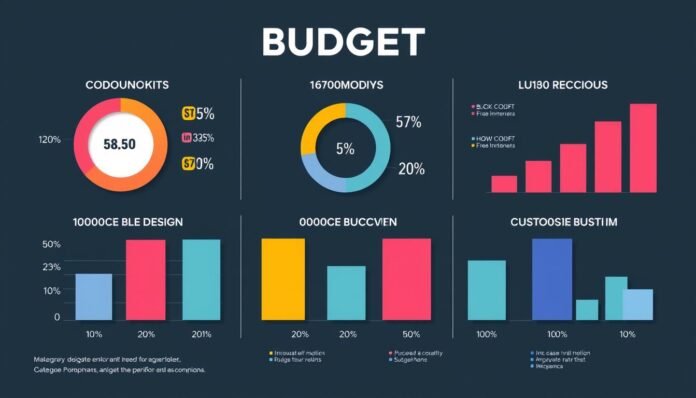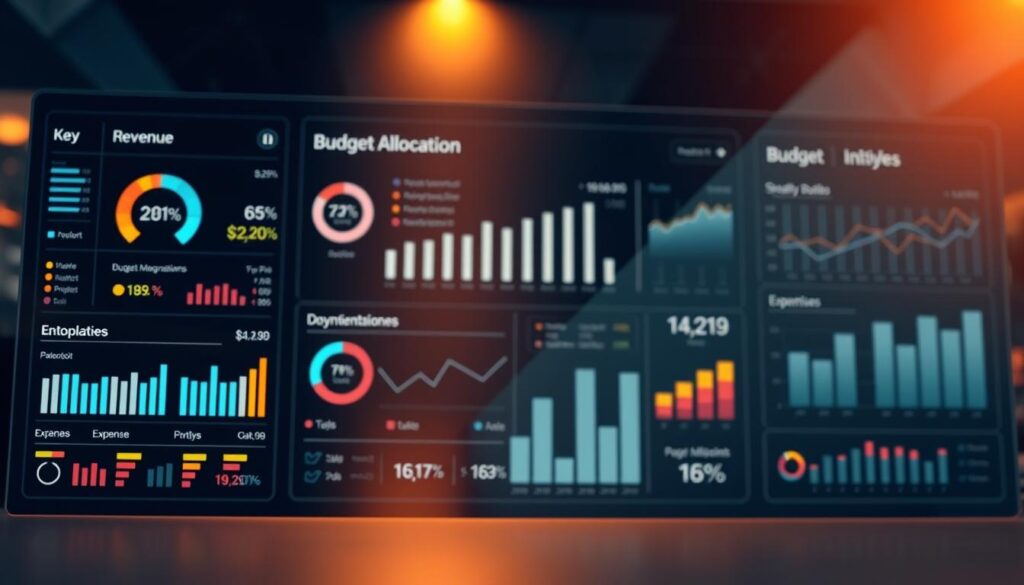In today’s complex financial world, knowing how to compare budgets is key. It helps both individuals and businesses make the most of their money. This guide will show you why budget allocation is important for good financial management.
It will also help you deal with economic challenges better. By learning how to budget well, you can make your finances more stable. This leads to better decisions and a stronger financial future.
Table of Contents
Key Takeaways
- Effective budget allocation is vital for financial health.
- Comparing budgeting methods improves decision-making.
- Budget allocation comparison helps find ways to use resources better.
- Understanding financial planning comparison leads to better outcomes.
- Using budgeting analysis techniques improves fiscal management.
Understanding Budget Allocation
Budget allocation is key to managing an organisation’s money well. It means spreading out funds to different areas or projects. This way, each part gets enough money to work well.
This process helps you see what’s most important. It’s based on what the organisation wants to achieve.
What is Budget Allocation?
Budget allocation means setting aside money for certain activities or projects. It’s about looking at costs, what’s most important, and the financial plan. A good comparison helps find the best way to use your money.
Using flexible budgeting lets organisations change how they spend money. This is useful when things change or when the market shifts. Knowing this helps make better financial choices.
Importance of Effective Budget Allocation
Good budgeting is very important. It helps use money wisely and makes every pound count. It helps reach financial goals and makes sure money is spent well.
Keeping an eye on the budget is key for success. It means fixing any problems quickly. Getting everyone involved in budgeting helps everyone work together better.
For more tips on keeping a budget in order, check out this expert analysis.
Types of Budget Allocation Methods
Learning about different budget allocation methods can really help with your financial planning. Each method has its own purpose and can be tailored to fit your needs. Let’s look at some common budgeting techniques.
Incremental Budgeting
Incremental budgeting starts with last year’s budget and adds a bit more for this year. It’s simple and easy to use. But, it might keep old ways of spending and not change when needed.
Zero-Based Budgeting
Zero-based budgeting is different. It makes you justify every expense, starting from zero. This method helps you really think about your spending. It makes sure you’re spending on what’s really important without just adding more money.
Modified Budgeting Techniques
Modified budgeting mixes parts of incremental and zero-based budgeting. It lets managers adjust budgets but also makes them justify big spending. This way, you can focus on what’s important while keeping an eye on costs.
| Budgeting Method | Advantages | Disadvantages |
|---|---|---|
| Incremental Budgeting | Simplicity and ease of use | May perpetuate inefficiencies |
| Zero-Based Budgeting | Thorough expense justification | Time-consuming and resource-intensive |
| Modified Budgeting Techniques | Flexible and strategic | Balancing justification with operational needs |
Picking the right budgeting method is key to your financial health. Comparing these methods can help you choose the best one for your goals and budget. For more on budgeting, check out this useful resource.
Budget Allocation Comparison: Key Metrics to Consider
Understanding key metrics is vital for budget comparison analysis. Effective resource allocation impacts financial health and future decisions. Focusing on cost effectiveness and return on investment (ROI) offers essential insights for budget optimisation.
Cost Effectiveness Analysis
Cost effectiveness analysis is key in seeing if spending is worth it. It helps evaluate spending against benefits. By reviewing costs, you can spot where to save and align resources with goals.
By choosing projects that offer more value for money, organisations can improve budget effectiveness.
Return on Investment (ROI) Evaluation
ROI evaluation measures the profit from investments. It shows how budget aligns with goals. This metric helps see which spending brings the most financial gains.
Using ROI in budget comparison analysis makes decisions data-driven. It aids in discussing future investments.
Tools for Budgeting Analysis
Having the right tools is key when managing your budget. They help track expenses and ensure your money is well spent. There are many software options out there, each with its own strengths. This section will look at some top software and what makes them great for budgeting.
Software Solutions for Budget Tracking
There are many tools for budgeting analysis. Here are a few:
- Mint: It’s easy to use and automatically sorts your expenses.
- YNAB (You Need A Budget): It focuses on planning ahead and setting financial goals.
- EveryDollar: It’s simple to use for planning, tracking, and managing your money.
- QuickBooks: Great for small businesses, it offers detailed bookkeeping features.
Features to Look for in Budgeting Tools
Choosing the right budgeting tool means looking at certain features. Here are some important ones:
| Feature | Description | Importance |
|---|---|---|
| User Interface | How easy it is to use and how it looks. | Makes it fun to use and easy to learn. |
| Compatibility | If it works with your bank and other financial apps. | Helps track money accurately and saves time. |
| Analytical Functionalities | Tools for seeing budget trends and spending habits. | Helps make smart money choices. |
| Support Resources | Help like tutorials, customer service, and forums. | Helps solve problems and get the most out of the tool. |
Comparing budgeting software can really help manage your money better. The right tools let you track your budget more effectively. This way, you can make your money work for you.
Expense Allocation Evaluation Techniques
Understanding how to allocate expenses is key to improving your financial plans. It’s important to know the difference between fixed and variable costs. This helps you see where your money goes and how to spend it wisely.
Fixed vs Variable Costs
Fixed costs stay the same, no matter how much you work. Examples are salaries and rent. Variable costs, like raw materials and sales commissions, change with your activity level.
Knowing this helps you make smarter choices about where to spend your money. It improves your overall financial planning.
Activity-Based Costing Overview
Activity-based costing is a detailed way to track costs. It links costs to specific activities in making goods or services. This method helps you see how resources add value.
Using it can reveal new insights into your budgeting. It leads to better management of resources and more accurate expense tracking.
Monitoring and Adjusting Allocations
Keeping an eye on and adjusting your spending is essential for financial health. Regular checks help you adapt to market changes and internal shifts. By regularly reviewing your budget, you stay on top of your finances.
Being flexible helps your business thrive. For more on adjusting your spending, check out this link.
Budget Tracker Comparison: Finding the Right Fit
Looking for the best budgeting app can really help with your money management. We’ll compare some top apps, looking at their features, costs, and what users say. This will help you pick the right one for you.
Comparison of Popular Budgeting Apps
There are many great budgeting apps out there, each with its own special features. Here’s a look at some of the most popular ones:
| App Name | Cost | Key Features | Best For |
|---|---|---|---|
| YNAB | £11.99/month or £84/year | Zero-based budgeting, goal tracking | Hands-on budgeters |
| Goodbudget | Free version; £10/month or £80/year for premium | Envelope budgeting, expense tracking | Envelope method enthusiasts |
| EveryDollar | Free version; £80/year for premium | Easy expense tracking, budgeting goals | Simplicity seekers |
| Mint | Free | Expense tracking, credit score monitoring | Comprehensive financial overviews |
| PocketGuard | Free and premium plans available | Spending limits, financial insights | Visual budgeters |
| Empower Personal Wealth | Free | Budgeting with investment tracking | Investors |
| Honeydue | Free | Couples’ budget sharing, bill tracking | Couples managing finances |
User Experiences and Reviews
User feedback is key in choosing the best budgeting apps. YNAB is loved for its dynamic budgeting approach. Goodbudget is praised for its easy-to-use envelope method. EveryDollar is popular for its simple design.
Mint is a top choice for its wide range of features, including expense tracking and credit score monitoring. PocketGuard is great for setting spending limits, helping users avoid overspending. Empower Personal Wealth is unique for combining budgeting with investment tracking. Honeydue is perfect for couples, making budgeting together easier.
Choosing the right budgeting app can be tough with so many options. A detailed budget tracker comparison helps you find the best app for your needs. This makes managing your finances easier.
Financial Planning Comparison: Benefits of Analysis
It’s key to know the difference between short-term and long-term budgeting. Each has its own way of shaping your financial plan. Short-term budgeting helps with urgent expenses, while long-term planning builds wealth over time.
Short-Term vs Long-Term Budgeting
Short-term budgeting deals with immediate needs, usually within a year. It helps manage daily finances. Long-term budgeting, on the other hand, plans for big goals like retirement or education. Both have their benefits, but their focus affects your financial health differently.
The Role of Financial Forecasting
Financial forecasting is vital for both short and long-term budgeting. It helps predict income and expenses, guiding your budgeting. Good forecasting makes your budgeting more effective, helping you reach your financial goals.
Strategies for Budget Optimisation Assessment
Optimising budget allocations means focusing on waste and using data wisely. Spotting waste can greatly improve how your money is spent. A detailed budget assessment helps you check spending and find where money is not being used well.
Identifying Waste in Budgeting
Finding wasteful spending is key to a strong financial plan. Regularly check your budget for any issues or where money could be better used. This ensures every pound is spent wisely, boosting efficiency.
Try using variance analysis to spot big cost changes. This method helps find where costs are different from what was expected. Learn more about it here: resource.
Leveraging Data for Decision Making
Using data to guide budgeting is essential for smart financial choices. Historical data helps in making better forecasts and moving resources for better results. Analytics tools offer insights that shape your budgeting plans, focusing on what matters most.
By regularly reviewing your budget’s performance, you can make adjustments. This leads to a more efficient financial operation.
Conclusion
In this budget allocation comparison, we’ve looked at different strategies for better financial decisions. By understanding various budgeting methods, you can make choices that fit your goals. This summary shows how managing resources and planning finances wisely can stop overspending and improve investments.
Using the methods we’ve talked about can help your business’s financial health. Regular budget reviews promote a culture of responsibility and efficient use of resources. Getting your team involved in budgeting can improve communication and teamwork.
Remember these tips for a lasting budgeting strategy. Always check your budgeting practices to find waste and new opportunities. For more tips and advice, check out this detailed guide on budget allocation.
FAQ
What is the difference between incremental budgeting and zero-based budgeting?
Incremental budgeting builds on last year’s budget, making it simple but might keep old inefficiencies. Zero-based budgeting, on the other hand, starts from scratch, improving financial planning and resource use.
How can I evaluate the cost-effectiveness of my budget?
To check if your budget is cost-effective, compare the benefits of spending with the costs. This helps focus on where your money can make the biggest difference.
What features should I look for in budgeting software?
Look for budgeting software with an easy-to-use interface and works well with other financial tools. It should also have strong analysis tools and extra help for tracking and planning your finances.
How can I monitor my expense allocations effectively?
Keep an eye on your spending by regularly checking and adjusting your budget. Using activity-based costing can also help you see how much each activity costs, making tracking easier.
Why is financial forecasting important in budgeting?
Financial forecasting looks ahead to predict future money situations. It helps you make smart budget choices by preparing for different scenarios, ensuring you meet your financial goals.
What are some strategies for optimising my budget?
Cutting unnecessary spending is key to a better budget. Also, using data to make decisions can help you use your money more wisely, aligning with your financial goals.
How can I compare different budgeting apps?
When comparing budgeting apps, look at how users like them, what they can do, how much they cost, and how well they work. Reading what others say and weighing the good and bad points can help you pick the right one for you.









